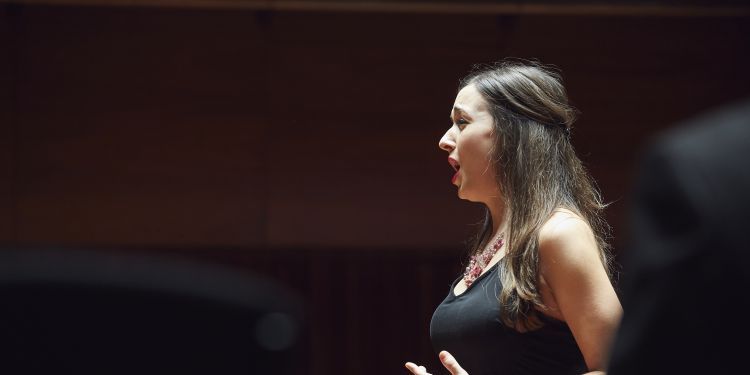Breadcrumb navigation
Finding a Voice

Finding a Voice - Research Project
Principal Investigator: Karen Wise
Research Team: Andrea Halpern (Bucknell University, USA)
Project Dates: April 2016 – January 2020
Project Aims
This project engages people who ‘don't sing’ in specially-designed programmes in order to understand the journeys adult non-singers take in learning to sing, and the ways they can be supported through a combination of psychological, educational, and artistic research.
It investigates the best ways of helping non-singers engage in meaningful participation in singing, to both improve their skills and show what their developmental trajectories look like.
Project Context
Singing is receiving growing attention in both popular culture and academia as an activity that offers numerous benefits for wellbeing throughout life. However, many adults exclude themselves from singing: around 17% of the UK population self-define as 'tone deaf', and likely many more as 'non-singers'.
Although there is ample evidence that singing skill is open to improvement, there is little research on how this happens. While it is known that non-singers' self-image and confidence can be improved by supportive opportunities, knowledge is limited about how these changes, and improved skills, are related to specific learning activities and contexts. Meanwhile, the professional craft of singing teachers, who often report success in teaching those with singing difficulties, is largely undocumented. This project will integrate hitherto separate areas of research and practice to reflect the multifaceted nature of singing as a means of expression and communication.
Project Progress
In the first phase (September 2016 to June 2017), the project worked with a group of people who considered themselves non-singers over the period of one academic year, engaging them in individual and group sessions to track both their progress and effective teaching practice.
The second phase focused on the development of an app to train auditory imagery – the ability to imagine sounds in the 'mind's ear' – and assess the effect of this on singing.
Two years after their involvement in the project ended, most of the original 20 participants have reclaimed singing in their lives, participating in choral societies (including the LSO Community Chorus) and other groups, or singing for their own private pleasure.
Associated Events
A one-day conference on 9 July 2019 brought together a range of different perspectives to discuss Finding a Voice research findings and related external contributions.
Project Outputs
Outputs include: Wise, K., & Halpern, A. (2024). The Activated Singer: Components of an Emerging Singing Identity in Adults Learning to Sing. Music Perception, 41(4), 288-306, available to read here.
Initial project findings allow a number of broad conclusions:
- Participants’ attitudes and beliefs associated with singing showed significant positive change after 6 months. Skill development, however, did not follow an obvious pattern, and was highly individualized.
- In some cases, measurable skills such as pitch accuracy appeared to worsen with instruction before getting better. This makes sense when we think of singing as a complex motor skill, but it has not been reported before.
- Outcomes from the practical work challenge some of the prevailing assumptions about what makes an accessible singing opportunity for adult novices. There were key challenges faced by participants, including poor musical working memory, underdeveloped vocal sensorimotor skill in singing, and perceptual difficulties experienced when trying to sing in a group situation. This means that some common approaches taken in the provision of singing opportunities – particularly large group formats and learning songs ‘by ear’ – are not appropriate for this group of non-singers. Rather, these approaches are likely to exacerbate feelings of fear and lack of competence, and reinforce participants’ experience of ‘not getting it’.
- Participants also reported having felt alienated in the past by the well-meaning assertion that ‘everyone can sing’, and favoured the more nuanced message ‘everyone can learn to sing’. The project showed participants’ vital need and desire for learning and skill development, beyond simply being offered a safe and supportive context in which to sing. In this context, technical guidance and sheet music – often characterized as ‘barriers’ to novices – formed part of a multi-modal approach which facilitated access to a singing culture, as well as supporting cognitive capabilities.
This project was supported by an Early Career Project Grant from the Arts and Humanities Research Council (AHRC). The Arts and Humanities investigate the values and beliefs which underpin both who we are as individuals and how we undertake our responsibilities to our society and to humanity globally. For further information on the AHRC, please visit their website.
